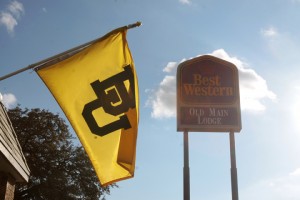
Baylor plans to enrich campus aesthetics and make the campus more pedestrian-friendly by trading concrete for greenery. Plans are in place to demolish Best Western and China Grill along with various in-campus roads in order to give the campus a more eco-friendly appeal.
Baylor plans to beautify campus with grass
By Leigh Ann Henry
Reporter
The demolition of Ivy Square, which took place last August, left many students upset because of removed parking spaces.
Demolition is set to continue in the next four to five years as Baylor’s leases with China Grill and Best Western also come to an end and those buildings are razed for fields as well.
“We want people that come through Waco to be able to see campus, whereas they used to see Ivy Square and all those other developments up front,” Brian Nicholson, associate vice president of facility, planning and construction, said.
The plans are to turn some of that area of campus into playing fields for additional intramural space as Baylor continues to expand over the next several years.
Nicholson said the immediate benefit of the Ivy Square demolition is aesthetics; as people drive down Interstate 35, they can see campus unobstructed by
old buildings and wasted space.
Plans for continuing construction and expansion are set for this summer to remove the roads that run north and south bordering Fountain Mall and replace them with grass and sidewalks.
In the upcoming years, Baylor officials hold the same goal for the span of Fifth Street that runs in front of the Bill Daniel Student Center, where the road is blocked off to through-traffic.
These changes will give the interior of campus a more open and appealing look, which, administrators hope, will improve Baylor’s environmental personality.
“It’s an effort to make the campus more attractive and pedestrian friendly. This, in turn, encourages people to be outside more often and also promotes outdoor activities,” Smith Getterman, sustainability coordinator at Baylor, said.
This goal is apparent in the removal of the side road connecting Eighth Street with the I-35 access road located by Brooks Village.
Getterman said closing campus to more through traffic should make it safer and more pedestrian-friendly since there will be fewer cars driving around the streets.
Nicholson said prospective students determine the overall feel of a campus within the first few minutes of their arrival.
“Anything the university can do to improve the overall look says a lot, so it certainly helps the case,” he said.
Nicholson said the percentage of occupied spaces at Ivy Square was low and many of the units were unused.
Nicholson said that with age, some buildings get in a state of disrepair so they require much in maintenance dollars and upkeep.
“If you’re not going to utilize the space it makes sense to go ahead and get the land and use it for something else,” Nicholson added.
The demolition and construction Baylor will be tackling in the next several years looks to be costly, but, a lot is being done to salvage and recycle materials.
Nicholson said Lindsey Contractors, a local asphalt company, salvaged all of the asphalt from the Ivy Square demolition. The company did not charge Baylor for the removal process and recycled that asphalt for future use.
Both Getterman and Nicholson agree that as the campus expands, Baylor will attempt to utilize more companies and contractors for salvaging materials.






